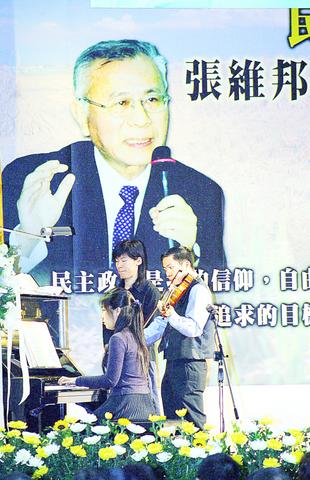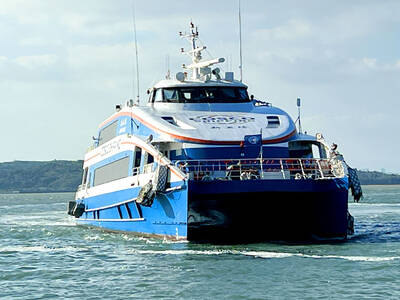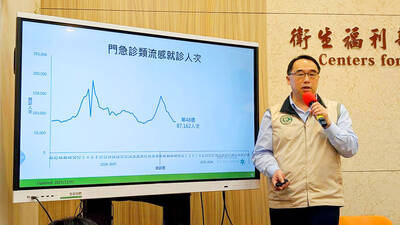The sudden loss of independence activist and professor Chang Wei-penn (
Chang fell victim to a heart attack as he was about to leave the Paris residence of his Russian friend Andrei Grachev on Dec. 2.
"Within 30 or so seconds, he closed his eyes at the home of Dr. Grachev, who used to work as press secretary to former Russian president Mikhail Gorbachev. Dozens of doctors endeavored to save his life, but to no avail," said Chang Wei-chia (張維嘉), Chang's younger brother.

TAIPEI TIMES FILE PHOTO
During his visit to his friend Grachev, the late professor was believed to have been examining the possibility of inviting Gorbachev to visit Taiwan -- a move consistent with his devotion to expanding Taiwan's external ties through academic channels.
Chang Wei-chia said he felt great anger following the death of his 65-year-old brother.
"At first I was saddened, then I was angry, because he passed away within 30 seconds without saying good-bye, leaving so many things behind," Chang Wei-chia said.
Prior to his arrival in Paris on Dec. 1 en route to Brussels to attend the global meeting of the European Community Studies Association (ECSA), Chang Wei-penn had purchased a new flat in Hsintien, Taipei County, to pave the way for his retirement in January.
But his new residence, containing thousands of classical music CDs and countless books, will never see the return of its owner, remembered by his loved ones as a devoted activist, a far-sighted academic and teacher, and a good friend.
Born in 1937 in Shulin, Taipei County, Chang obtained his first degree in international trade at National Taiwan University before obtaining a full scholarship for a PhD in economics at the University of Fribourg, Switzerland, in 1962.
While Chang obtained his PhD within four years, Chang found Taiwan had shut its doors to him because authorities had blacklisted him, along with his younger brother who was then in Europe, because of their advocacy for independence.
Chang's old friend Hung Lien-te (
"The `white terror' orchestrated by the then KMT government also spilled over to Europe ... and yet Wei-penn and I strove to fight for our beliefs together in Europe," Hung said.
The younger Chang said their firm belief in the democratization of Taiwan had enabled them to survive decades without a home.
Chang Wei-penn had taught in Canada and Japan before deciding to return to Taiwan in 1994 -- leaving behind his spacious home in Canada and lucrative retirement arrangements that were just around the corner.
As well as teaching at Tamkang University's European Institute, Chang had taken entrepreneurs and young students on field trips to Europe in an effort to address Taiwan's lack of understanding of the continent.
In 1998, he founded ECSA-Taiwan, a Taipei-based academic group devoted to European studies, and endeavored to get his brainchild admitted as one of the 39 official members of ECSA, a global organization on European studies with more than 8,000 members worldwide.
The late professor had also called for the establishment of a Taiwan Plaza in Europe and the founding of a House of Europe in Taiwan to promote understanding between Europe and Taiwan.
Concerned with the limited world-views held by young people, the late professor had also envisioned founding a Formosan School of Global Studies to cultivate and broaden students' views.
But his death has left his dreams unfulfilled and his loved ones see his loss as a serious blow to the nation.
"He has with great confidence exchanged ideas with his overseas counterparts in fluent French and English, a rare caliber for Taiwan. But it's a pity that he never had the opportunity to serve his country," Chen Wen-hsian (
Chang Wei-chia feared that his late brother's contacts in global academics established over the decades would be buried with him as well.
"What my brother accomplished was academic diplomacy. ... His relations with many international academics were established not one or two years ago -- they were the result of decades of friendship," Chang Wei-chia said.
Many attending a memorial ceremony for Chang Wei-penn in downtown Taipei on Saturday morning vowed to continue his devotion to boosting ties with Europe.
"Although our teacher has passed away, he would have expected to see his students in all walks of life follow in his footsteps," said Chen Hsing-chi (陳信吉), a student who attended at the ceremony.
Chang's widow spoke of ways to remember his passing.
"Let's continue to support ECSA-Taiwan and to boost ties between Europe and Taiwan. Have faith in Taiwan as a beautiful country. This is the best way to remember Wei-penn in one's heart," Chen Shu-yen (陳淑燕) said at the ceremony.

PROCEDURE: Although there is already a cross-strait agreement in place for the extradition of criminals, ample notice is meant to be given to the other side first Ten Taiwanese who were involved in fraud-related crimes in China were extradited back to Taiwan via Kinmen County on Wednesday, four of whom are convicted fraudsters in Taiwan. The 10 people arrived via a ferry operating between Xiamen and Kinmen, also known as the “small three links.” The Kinmen County Prosecutors’ Office yesterday said that four of the 10 extradited people were convicted in Taiwan for committing fraud and contravening the Money Laundering Control Act (洗錢防制法), and were on the wanted list. They were immediately arrested upon arrival and sent to Kinmen Prison to serve their sentences following brief questioning, the office said.

Taipei and Kaohsiung have extended an open invitation to Japanese pop star Ayumi Hamasaki after Chinese authorities abruptly canceled her scheduled concert in Shanghai. Hamasaki, 47, had been slated to perform on Saturday before organizers pulled the show at the last minute, citing “force majeure,” a move widely viewed as retaliation for Japanese Prime Minister Sanae Takaichi’s recent remark that a Chinese attack on Taiwan could draw a military response from Tokyo. Taipei Mayor Chiang Wan-an (蔣萬安) yesterday said the city “very much welcomes” Hamasaki’s return and would continue to “surprise” her. Hamasaki, who has a large global fan base, including

‘REGRETTABLE’: Travelers reported that Seoul’s online arrival card system lists Taiwan as ‘China (Taiwan),’ the Ministry of Foreign Affairs said The Ministry of Foreign Affairs yesterday urged South Korea to correct the way Taiwan is listed in its newly launched e-Arrival card system, saying the current designation downgrades the nation’s status. South Korea rolled out the online system on Feb. 24 to gradually replace paper arrival cards, which it plans to phase out by next year. Travelers must complete the electronic form up to 72 hours before entering the country. The ministry said it has received multiple complaints from Taiwanese travelers saying that the system lists Taiwan as “China (Taiwan)” in dropdown menus for both “place of departure” and “next

VIGILANT: Enterovirus activity remains in the epidemic phase, with the CDC urging caregivers of infected children to be on the lookout for signs of severe illness Influenza activity is rising in neighboring countries, and, with temperatures forecast to drop this week, flu cases are expected to increase in the next two weeks, the Centers for Disease Control (CDC) said yesterday. Hospitals reported 87,162 visits for flu-like illnesses between Nov. 23 and Saturday, which remained about the same level as the previous week, but nine deaths and 24 cases with serious flu complications were also confirmed last week, CDC Epidemic Intelligence Center Director Guo Hung-wei (郭宏偉) said. Flu activity reached a peak in late September before declining for eight consecutive weeks, CDC Deputy Director-General and spokesman Lin Min-cheng (林明誠)